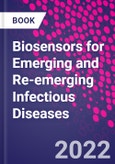Biosensors for Emerging and Re-Emerging Infectious Diseases provides a review of how cornerstone optical, electronic, nanomaterial and data processing technologies can address detection issues occurring in a pandemic event. This book gives insights into the fundamental physical, chemical and biological mechanisms needed for such a type of detection. The content covers potential biomarkers which can be used for the infectious disease diagnostic, helping readers find the appropriate approach for the diagnosis of infectious diseases. It presents a novel approach to transferring the sensing platform from lab to application in clinics and to point of care detection.
The book then moves on to discuss the function and efficiency of the biosensing platform in early diagnosis of infectious diseases compared to the standard methods. The required time, the technician skills and the steps which must be performed are other key factors of the biosensing platform which are well explained.
Please Note: This is an On Demand product, delivery may take up to 11 working days after payment has been received.
Table of Contents
1. Biosensors: principle, fundamentals history, recent trends and applications
2. Recent advances in development of immunosensors for infectious diseases
3. Magnetic point-of-care biosensors for infectious disease diagnosis
4. Advancements in electrochemical biosensors development for infectious disease diagnosis
5. Plant-based biosensors in disease diagnosis
6. Development of optical biosensors for the diagnosis of pathogens
7. Biosensor as quick analytic tool in pandemic
8. Trends of biosensors for the detection of Staphylococcus aureus as a key cause of foodborne illnesses worldwide
9. Rapid detection and diagnosis of emerging and re-emerging infectious diseases using biosensing techniques
10. Development of optical biosensor for diagnosis of microbial pathogens
11. Magnetic and colorimetric point-of-care biosensors for infectious disease diagnosis
12. Nucleic acid based biosensor as a cutting edge tool for point of care diagnosis
13. Strategies of detection and challenges for hepatitis C infectious disease
14. Point-of-care electrochemical biosensors using CRISPR/Cas for RNA analysis
15. Biosensing technologies applied in virus detection as rapid tools during pandemics: past lessons and recent trends
16. Biosensors for healthcare: an artificial intelligence approach
17. Development of biosensor-based non-invasive technologies and liquid biopsies for emerging infection diagnosis
18. Advantages of silicon nanowire-based biosensors as wireless technology for infectious disease diagnosis
19. Computational biology and biosensors as surveillance tools for emerging and re-emerging infectious diseases
Authors
Jayashankar Das Director of Research, Valnizen Healthcare Pvt Ltd, India.Dr. Das received his PhD in biotechnology and served as a Scientist at the IBSD, DBT, Government of India. He is the Founder and CEO of Valnizen which deals with regulatory documents and healthcare compliances and support services to African and southeast Asian countries. He has served as a Joint Director of the Gujarat State Biotechnology Mission, DST, and Joint Director to Gujarat Biotechnology Research Centre, DST, both from the Government of Gujarat. He has served as a Director of the Savli Technology and Business Incubator, DST, Government of Gujarat, India. He was actively involved in the development and implementation of various policies and action plans like biotechnology policy, innovation policy, interpole disaster management policy, start-up policy for many universities and governments. His research team is involved in addressing societal challenges via cutting-edge research, namely, the development of molecular diagnostics for infectious diseases, the development of universal vaccine candidate for emerging diseases, the development of miRNA-based targeted therapeutics, and artificial intelligence in healthcare applications.
Sushma Dave Associate Professor, Department of Applied Sciences, JIET, India.Dr. Sushma Dave received a master of science and PhD in analytical, electrochemistry, and environmental chemistry from the Biosensor Lab in the Chemistry Department of Jai Narayan Vyas University, Jodhpur. She is involved continuously in the field of higher education teaching pure, applied chemistry, cheminformatics, nanotechnology, electrochemistry, biology, solid waste management, wastewater treatment, and environmental chemistry to students of engineering and basic sciences. She also served as a Research Associate in the Soil Biochemistry and Microbiology Division, CAZRI, Jodhpur. She has published and presented over 50 papers in international and national journals, conferences and participated in various workshops and training programs. Her areas of interest are electrochemistry, biosensors environmental science, nanotechnology, biochemistry, cheminformatics, immunoinformatics, and drug repurposing.
S. Radhakrishnan Department of Organic Materials and Fiber Engineering, Jeonbuk National University, South Korea. Dr. S. Radhakrishnan did his Masters in 2007 from Vivekananda College, Madurai (Tamilandu, India) and Ph.D in 2014 from Alagappa University, Karaikudi (Tamil Nadu, India). After a post-doc at Jeju, Kongju, and Chonbuk Nantional University, South Korea, he joined the CSIR-Central Electrochemical Research Insitute as DST-Inspire Faculty in April 2016. He has been working in diverse areas of electrochemistry for the past 10 years. His research primarily focuses on the areas of Electrocatlysis of various chemical and biochemical compounds, direct electrochemistsry of DNA, proteins and enzymes, electrochemical characterization of carbon, polymers, nanoparticles, metal oxide and sulfides nanomaterials etc. He has published more than 44 research papers in reputed peer reviewed journals and written 4 book chapters. His research articles have got more than 1915 citations. He has presented more than 14 research papers in national and international symposia and delivered more than 7 invited lectures in India. He is the recipient of several awards like Indo-Korea Research Internship Award, DST-Inspire Faculty Award and best paper award from different organizations. Padmaja Mohanty Director, Valnizen Healthcare, Mumbai, India. Padmaja Mohanty has a Masters in Botany from Ravenshaw University, India and a PhD from Gujarat University. She has more than ten tears of research experiences in various leading organizations like North-Eastern Hill University, ICAR-National Orchid research center, DBT-IBSD and Gujarat University, India in the areas of Molecular Diagnosis, Therapeutics, genomics, conservation and sustainable development. She was trained in clinical research and CDM and served in Reliance Life sciences. She was also a cofounder of initiatives viz. "Valnizen" and "Beryycure�. She is a reviewer and editor in many peer reviewed journals.







